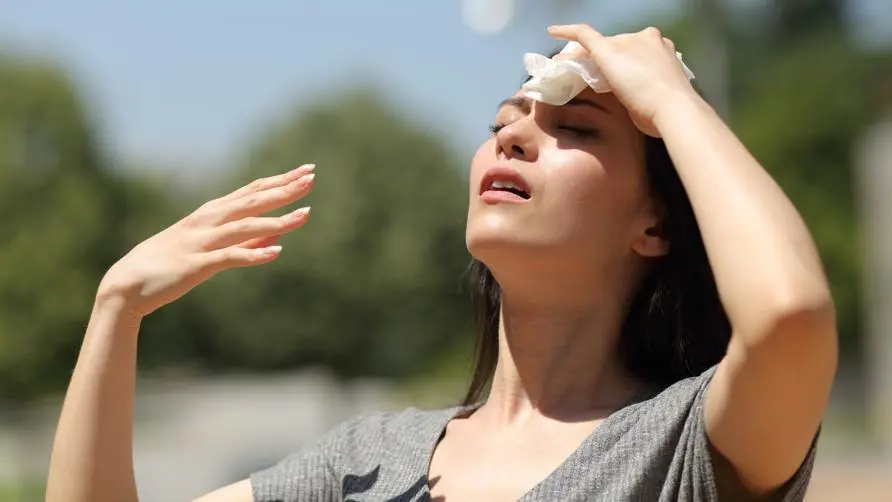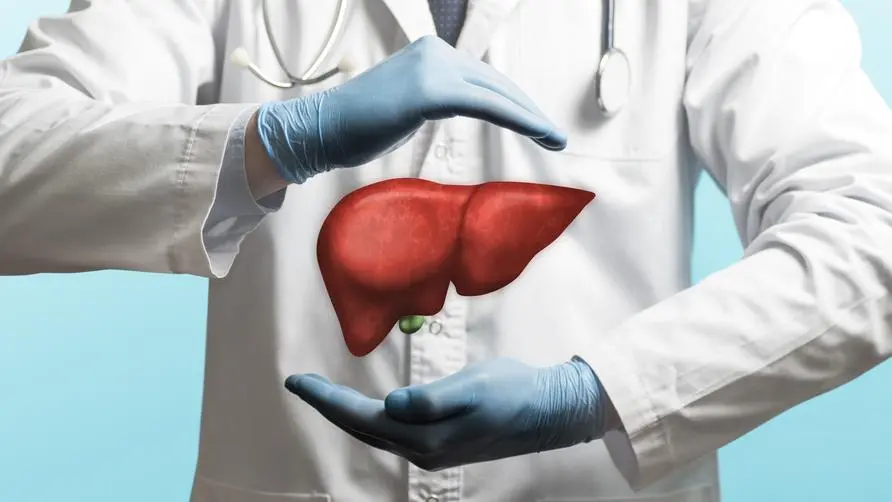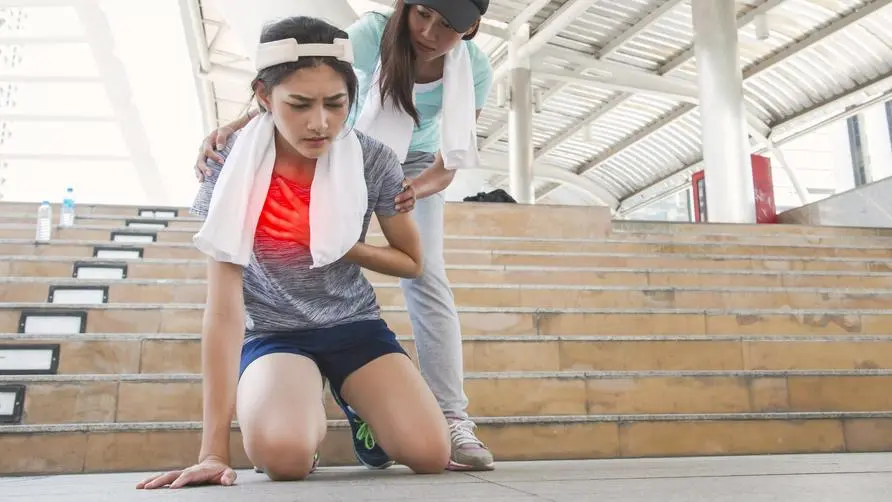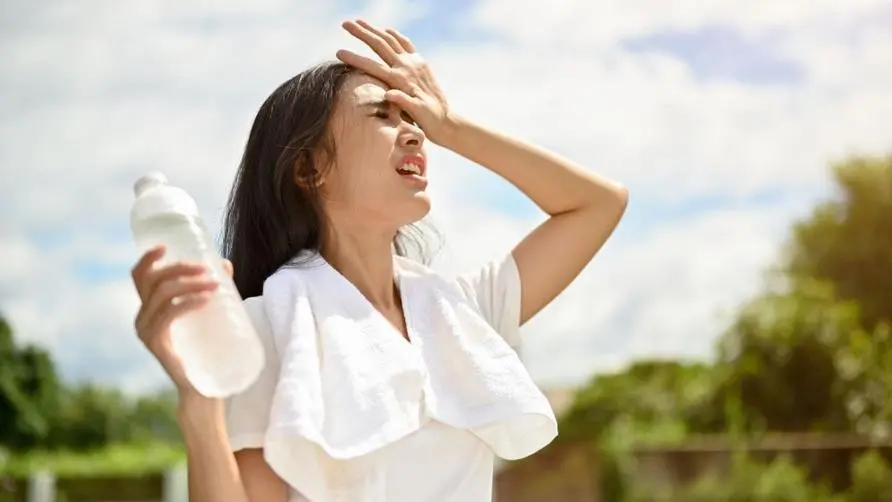The temperature is so hot! If the "color" of your urine is different, you may be in trouble. Is drinking water enough to prevent heatstroke?

The weather is hot and the craze may cause brain “collapse” if you don’t drink water
In order to prevent the spread of the new coronavirus epidemic, although the Epidemic Command Center announced that Taiwan has been lowered to Level 2 alert, you must still wear a mask and maintain social distance when going out to avoid the recurrence of community infections. However, it is summer, whether you are working outdoors or going out for activities, you will face summer high temperatures, and masks are more likely to cause heat injuries, and even cause heat exhaustion or heat stroke symptoms. In a season when the epidemic is cooling down but the temperature is rising, how should we face the harm caused by the “heat wave”?
The summer temperature in Taiwan is often above 34 or 35 degrees Celsius. Loss of water after activities and failure to replenish water properly may cause various “heat diseases”. Especially if you continue to exercise in a hot environment, you may accumulate excessive amounts of water in your body. Heat, and continued sweating can cause dehydration and electrolyte deficiency, which may cause the body’s heat dissipation mechanism to collapse. Generally speaking, when the body temperature increases slightly, if the nervous system can still function normally, symptoms such as headache, dizziness, nausea, vomiting, and weakness will occur, which is called heat exhaustion. Once the body temperature reaches above 41 degrees, It will cause the brain and other organs to collapse, and the mortality rate may be as high as 50%. Medically, it is called “heat stroke” in Chinese.
If you work outdoors and are exposed to the sun for a long time, remember these 4 tips to avoid heatstroke symptoms.
As the summer heat injury peak occurs, the Taiwan Health Promotion Administration reminds the public that the public can check the heat hazard risk level of their current location on the “Heat Hazard Warning Action Information Network”. If you need to work outdoors or be active for a long time, it is recommended to refer to the following four methods to prevent heat injuries and take preventive measures according to weather conditions:
1. Replenish water in time
In hot environments, drink water at all times, regardless of activity level, and do not wait until you are thirsty to refill. Outdoor workers also need to pay attention to the amount and color of urine at all times. If the amount of urine decreases and the color becomes darker, it means insufficient water in the body.
2. Pay attention to the temperature and humidity of the working environment and the conditions of your partners
It is very important to pay attention to changes in weather and temperature and humidity at any time. During outdoor operations, direct sunlight at noon should be avoided, and the working environment should provide shade, use heat insulation and ventilation equipment, and create a cool resting place; in addition, When working, you should avoid closed environments, maintain air circulation, and pay attention to the conditions of your partners at all times.
3. Take personal sun protection measures
When doing outdoor work, try to wear loose, breathable and light-colored clothes, take sun protection measures at all times, and wear a hat that can provide shade and ventilation.
4. Pay attention to personal health status
Pay attention to the use of drugs that may induce heat stroke, including drugs that increase heat production (such as thyroxine) or increase water loss (such as diuretics). Those who work in high-temperature or high-humidity environments should undergo pre-employment and regular medical examinations. Physical health check.
When thermal injury occurs and the discomfort and consciousness persist, you need to seek medical attention immediately.
In addition, the Taiwan Health Promotion Administration recommends that outdoor workers or people in need of drinking water can use the “Tea Serving Action” APP to quickly and conveniently find the nearest tea serving station (there are currently more than 7,000 stations set up across Taiwan) to reduce the use of plastic bottles, which can not only quench thirst but also be environmentally friendly.
When the body is suspected of showing signs of thermal injury, such as elevated body temperature, dry and hot skin that turns red, and rapid heartbeat, severe cases may cause symptoms such as inability to sweat, headache, dizziness, nausea, vomiting, and even confusion, cramps, and coma. Be sure to leave the hot environment quickly and try to lower your body temperature (such as loosening clothes, wiping your body with water or fanning, etc.), drinking cold water or electrolyte drinks with a little salt added; if your body temperature continues to rise, you vomit, or your consciousness continues to be unclear , please seek medical treatment as quickly as possible.
In addition to outdoor workers who need to pay special attention to the risk of heat stroke, ordinary people also need to pay special attention to sun protection when riding motorcycles, bicycles or walking to commute, or when they have to go out to buy meals during lunch breaks; and do not get sick by staying in an air-conditioned room for a long time. If you ignore the importance of hydration, working indoors will also cause your body to lose moisture quickly due to dry air. Although the downgrading of the epidemic prevention alert can give people a little breather, with the sun “full blast” in recent days, in addition to being careful about the invasion of new coronavirus pneumonia when going out, people must also be aware of the potential heat exhaustion crisis in hot weather at all times.
Source:
“Preliminary treatment of heat stroke”, “Gao Yi Medical News”, Volume 34, Issue 3
When working outdoors, we must work together to prevent the epidemic and also prevent heat injuries.





